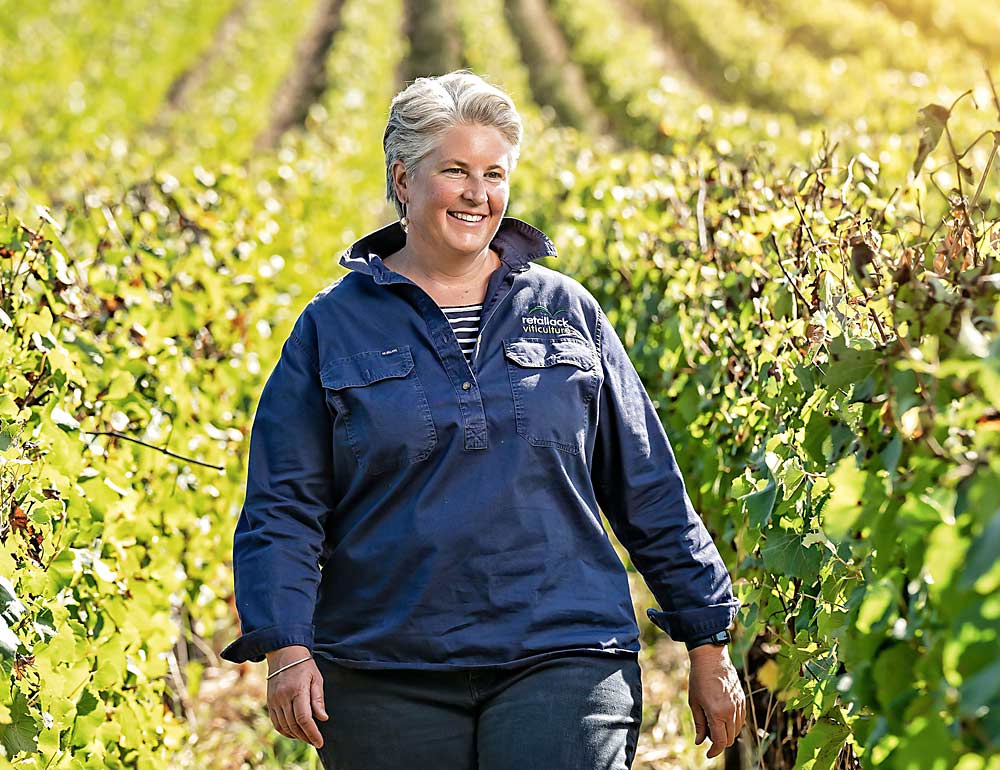—by Melissa Hansen, Washington State Wine Commission

Today, more than ever, tools and technologies are needed to keep the Washington wine industry competitive. Sustainable WA — Washington’s recently launched vineyard sustainability certification program created specifically for the state’s wine industry — focuses on practices that are good for the environment, good for the workforce and designed to keep wine grape growers economically viable.
Such topics will be highlighted at the 2025 WAVE: Sustainability in Action research seminar on April 23 from 8 a.m. to 5 p.m. at Washington State University’s Tri-Cities campus.
This year’s WAVE (Washington Advancements in Viticulture and Enology) combines two events into one: the annual WAVE research seminar and WSU’s Ravenholt Lecture series. A day for education, celebration and connecting, WAVE will highlight sustainable research efforts seeking solutions to winery and vineyard challenges, market trends for wines with eco-labels, research poster displays, a keynote WSU Ravenholt Lecture and a celebration of the Sustainable WA certification program leaders during a social hour.
EcoVineyards program
Internationally renowned scientist, agroecologist and third-generation viticulturist Mary Retallack will give the WSU Ravenholt Lecture. Retallack, a viticultural consultant, is based in Adelaide, Australia, and has a wide range of practical, extension and consultancy experiences, both within Australia and globally. She co-founded and manages the National EcoVineyards Program, a three-year, $2.2 million initiative funded by Wine Australia that supports wine grape growers to plant cover crops, enhance soil health and improve vineyard biodiversity.
The grassroots-focused program began in 2022 and works across nine wine grape growing regions. Through the program, growers have access to region-specific resources, demonstration sites, on-ground coordinators and extensive online resources. The participating eco-growers have set up 75 demonstration sites to test a range of ecological practices in their vineyards. Focus areas include soil health, ground covers and functional biodiversity, which is the flora and fauna found in the area, such as bats, birds and predatory spiders and mites.
The vineyard demonstrations incorporate the planting of native plant species to provide beneficial insect and pollinator habitat. This contributes both to the vineyard ecosystem for predatory insect species and the vineyard esthetics, creating a distinct look unique to Australia.
According to Retallack, more than 90 percent of Australia’s flora and fauna is endemic, and many of the predators valued in vineyards have co-evolved with the country’s native plants. Retallack said in an interview with the Australian Rural Leadership Program that functional biodiversity has been a great way to make sure their vineyards look uniquely Australian, showcase their flora and stand out in an international marketplace.
When it comes to functional biodiversity, Australian vineyardists have led the way internationally. The practices of Australian viticulturists — who manage about 150,000 hectares (370,000 acres) — are influenced by the EcoVineyards Program. Retallack’s invitation to visit Washington as the Ravenholt Lecturer speaks volumes about the Washington wine industry’s commitment to wine quality and sustainability.
During her talk, Retallack will share insight from the EcoVineyards Program and discuss general soil health and biodiversity practices and how they can be practically integrated into a vineyard management system. Following the seminar, she will visit Eastern Washington vineyards and meet with growers and wineries, speak to students and researchers, and explore further collaboration with the Washington wine industry.
WAVE agenda
During the seminar, the marketing and promotion campaign for Sustainable WA will be unveiled by Seattle marketing firm GreenRubino. The campaign is funded through a Specialty Crop Block Grant awarded to the Washington State Wine Commission from the Washington State Department of Agriculture. The vineyard certification program was launched in 2023. More than one-third of the wine grape acreage in Washington has been certified, and wines with the program logo are available in the marketplace.
Other topics to be discussed:
—Sustainable approaches to managing vineyard diseases, by Michelle Moyer, WSU Extension viticulture specialist.
—Sustainable technologies for winery sanitation, by Bob Coleman, WSU adjunct professor, and Tom Collins, WSU associate professor.
—Nonchemical options for weed management, by Lynn Sosnoskie, Cornell University weed scientist.
—Integrated weed management practices for Washington vineyards, by Riu Lui, WSU weed scientist.
—Energy-saving technologies for wineries, by Nate Weis, Silver Oak Winery, California.
—Mealybug mating disruption (It works!), by Monica Cooper, University of California Cooperative Extension, Napa County.
—Mealybug mating disruption efforts in Washington, by Doug Walsh, WSU integrated pest management statewide coordinator.
—Sustainable and eco-label marketing trends, by Jill McCluskey, WSU economics professor.
—Sharing the Sustainable WA message, by John Rubino, GreenRubino, Seattle.
—Celebration of Sustainable WA leaders, by Washington Winegrowers Association.
The WAVE seminar is the signature research event of the Washington wine industry and is co-sponsored by the Washington State Wine Commission and WSU. The Ravenholt Lecture is supported by an endowment from Albert Ravenholt, a pioneer of the Washington wine industry and founder of Sagemoor Vineyards.
For more details and registration ($40) for the WAVE seminar on April 23, visit: cvent.me/OxwomR.






Leave A Comment